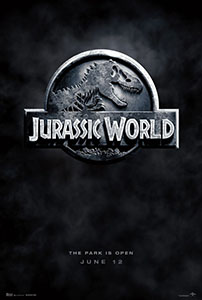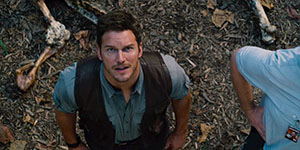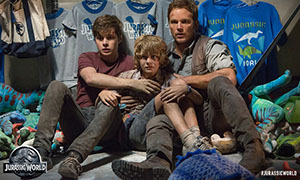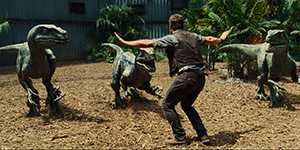Located off the coast of Costa Rica, the Jurassic World luxury resort provides a habitat for an array of genetically engineered dinosaurs, including the vicious and intelligent Indominus rex. When the massive creature escapes, it sets off a chain reaction that causes the other dinos to run amok. Now, it’s up to a former military man and animal expert (Chris Pratt) to use his special skills to save two young brothers and the rest of the tourists from an all-out, prehistoric assault. (Synopsis by Universal Pictures)
Since seeing “Jurassic World” several days ago, there is something I have to admit: I’m still not exactly sure what it was I saw. It was either one of the dumbest summer blockbusters this side of a “Transformers” sequel, or a brilliant $150 million joke made at the expense of paying audiences.
Not knowing what to think, two distinct possibilities came to mind. The first possibility is that the film’s writers took notes from a focus group of 10 year old boys instructed to spout off about what they would like out of a big-budget dinosaur movie, no expenses spared. Before you dismiss this possibility as total nonsense, note that there is a real show on Cartoon Network’s Adult Swim titled “Axe Cop” that originated from the ramblings of a kindergartener. The second possibility is a lot more flattering, but in an admittedly backhanded sort of way. There are a number of clues suggesting that the film’s creators were all in on an elaborate ploy to turn the movie into one giant criticism of its own audience and financiers. And the kicker is that it may have all been by accident.
Bad to the (Dinosaur) Bone
We are all familiar with the variety of movies dubbed “so bad they’re good.” The wild popularity of 2013’s “Sharknado” at least made you aware that there is a demographic for them large enough to warrant national attention. These kinds of movies have long since been hard to figure out because no one is quite sure how to explain their appeal. We’ve all seen bad movies before, and we’ve all mocked the ones we hate the most. But why and how is it that certain movies manage to garner affection for their ineptitude?
Building off what John Perich proposes in his article on Overthinkingit.com, how these movies function seems simple enough. Movie “X” has to make us believe that it’s not actively trying to be bad, yet be absurd enough at parts to raise doubt. The working assumption is that the makers are far too incompetent to achieve better, yet their labors are somehow able to demonstrate enough skill to make something entertaining at a base level. Basically, it’s like comparing one baseball pitcher who hits a batter in the shoulder with another pitcher who manages to hit a batter in the groin. The former fails in a way that doesn’t raise many eyebrows. The latter fails so spectacularly that he raises serious doubts about his true intentions.
There are elements in “Jurassic World” that raise the same doubts about its true intentions. In contrast to the original “Jurassic Park,” wherein adult characters acted with reasonable pragmatism and sensibility, in “Jurassic World” we can at one point find Bryce Dallas Howard’s character running in slow motion from a certain twenty-foot carnivore in 4” heels without breaking stride. In “Jurassic Park” the adult characters proved to have contingencies for almost every predictable problem they could face. In “Jurassic World” they demonstrate zero forethought for handling even the most likely of complications. There is even a species of smaller dinosaurs is shown to have the bodies of pterodactyls and the heads of T-Rexes.
So, the Movie is Bad in a Good Way?
Not so fast. To determine that, we first have to figure out what director Colin Trevorrow’s objectives were. A good place to start digging is an interview in which he explains how the film’s central dinosaur (the Indominus Rex) is a metaphor for the whole film.
“The Indominus was meant to embody our worst tendencies. We’re surrounded by wonder and yet we want more. And we want it bigger, faster, louder, better. And in the world of the movie the animal is designed based on a series of corporate focus groups. Like in the same way a lot of movies are. […] We’re so surrounded by so much of this marketing and just being told on a regular basis that you have to like this, you will go here, you want this. I found that to me that fit perfectly into what a theme park of dinosaur[s] would be about. […] We live in a cult of the upgrade right now. There’s always something around the corner that will make whatever you think is cool right now feel obsolete. And I feel like the Indominus rex is the animal version of that.”
To be fair, Trevorrow is only explaining how the excessiveness of the Indominus Rex functions as a symbol for consumer indulgence. He doesn’t say in black-and-white terms whether the film itself is intentionally ridiculous. Because of this, we’re forced to give him the benefit of the doubt. However, knowing what the flagship dinosaur represents encourages us to interpret the film in certain ways.
If the Indominus Rex represents the park which created it, then we can see it likewise represents the movie as a whole. Taking this further, the park’s director, Claire (Howard), must then be a stand-in for studio interests. And Owen (Pratt), the hands-on character who understands thematic consequences and demonstrates an ability to wrangle the film’s stars, is director Trevorrow. And the fact that (Spoiler Alert) the two become boyfriend and girlfriend in the end suggests that they are happy to be together despite having to endure the chore of placating the rabid hordes.
You’re Saying the Movie Hates Its Audience?
I’m saying it’s hard to tell. And I’m afraid things get even more complicated when we consider the film’s other possible intentions. Contradictory to the goal of appeasing the audiences’ need for the fresh and new is the goal of giving them the older things they love; that inspired their adoration for the franchise in the first place. Aside from Hollywood’s long-held insistence on recycling formulas, we have to take into account that the first “Jurassic Park” debuted over twenty years ago. This means that a large portion of the new film’s audience is comprised of people who were just kids when they saw dinosaurs come to life on screen for the first time. Not only that, they’ve become the largest chunk of the most sought-after age demographic of 18-49 year olds. Don’t think Universal didn’t notice.
The nostalgia factor is played up here as much as it possibly could be. References to the first film (and almost exclusively the first film) abound in virtually every scene. Even the plot shares near countless parallels. Reference: two siblings who don’t get along but find a way to survive together; a dinosaur expert who acts as the voice of reason no one pays attention to yet takes up the hero mantle when things are at their worst; a detached park operator whose bad judgements cause the park to erupt in chaos; an ever-present theme about mankind’s hubris toward nature; et cetera, et cetera…
More to the point, it seems to never stop. On multiple occasions, several different characters wonder aloud why Jurassic World—both the park itself, and by extension the movie—even exists. There is a lot of flagrant reverence for the original that is paid in a way that impresses an attitude of reluctance, even disinclination, on the part of Universal. It’s as if they’re asking us, “We already made this movie, why are you forcing us to make it again?” And if that’s the case, they’re pretty much saying, “Look, we all know there is no chance of this movie supplanting the original in any way, much less in the ‘wow factor’ sense. Let’s just spend two hours together waxing nostalgic for one of Hollywood’s all-time greats.”
It’s as if they went into the project with a defeatist attitude and discovered that as long as they keep reminiscing about the original “Jurassic Park” then this latest one would be a lot more tolerable to watch and to make. As an added bonus, they would appeal to the crowds that knew going in that they’ll always like the first one the best because they grew up with it. (Without providing spoilers, I can tell you that the ending is most indicative of this position.) The film openly laments how any efforts to outdo the novelty of the original would have been futile.
Where Are You Going With This?
I’m getting there, I promise. Between Trevorrow explaining how Indominus Rex is a metaphor for America’s upgrade culture meant to placate audiences’ hunger for the newer and better, and the studio’s probable disinterest in the project’s creative makeup, it’s easy to see how “Jurassic World” was predestined to stray from the spirit of the series’ first three films. Regarding Universal’s role in particular, let me express an understanding of the studio’s disinterest if it’s at all due to fatigue. Since the release of “Jurassic Park III” in 2001, a volume of drafts of the fourth film’s script were written, re-written, re-tooled, completely scrapped and replaced wholesale all the way up to the time of filming. That’s a span of twelve years.
Director Trevorrow hinted during filming that he held a very different perspective of the franchise’s star characters compared to his predecessors. When confronted about the film’s scientific inaccuracies and how it fails to acknowledge significant discoveries about dinosaurs since the making of the first three films, Trevorrow’s response was, “It is a science-fiction movie, not a documentary.” For most sci-fi projects, Trevorrow’s words would have been perfectly acceptable.
However, ever since the first “Jurassic Park” the allure of seeing realistic-looking dinosaurs was based on the fact that they used to actually exist. Audiences were encouraged to view them as animals rather than monsters, and did so enthusiastically. Plus, this allowed them to absorb the story’s theme about man’s place in nature. By contrast, Trevorrow’s “Jurassic World” readily portrays its dinosaurs as the monsters they’re meant to function as. And they’re alleged “unreal-ness” only works to underscore this. Consider another quote from Trevorrow’s interview: “I know there’s a lot of both fans and people who love movies that are frustrated that we would have anything but real dinosaurs in the film. But to me that’s the whole point.”
If nothing else, Trevorrow is at least consistent. If we accept that the Indominus Rex is meant to represent the public’s hunger for constant evolution, then surely we must recognize that having unfaithfully rendered dinosaurs of all types fits into the idea that the movie is meant to be a symbol for that appeasement. This is taking into account the irony that the more accurate depictions would have actually been newer. Then again, showing the dinosaurs as we’re used to seeing them also helps satisfy our appetite for nostalgia and sameness. Where do the contradictions end?!
Just Tell Us What This Is All About!
Okay! Okay! Ultimately, we can conclude that “Jurassic World” is a conceptual mess. It doesn’t quite know what its purpose is. It wants to appease audiences who obsess over the most improved versions of already wondrous things yet simultaneously argues that trying to create such things is a fool’s errand because they’ll never outdo what’s already been done. It wants to placate our nostalgia for “Jurassic Park” but also be different enough in its approach to stand in stark contrast to it. And what is probably most frustrating about all this is that it epitomizes American audiences’ love/hate relationship with Hollywood franchises in general.
We really do want one thing to be both old and new at the same time. We badly want continuations of the stories we love while at the same time openly lament how they almost never live up to our expectations. In capturing this dissonance, “Jurassic World” deserves a lot of credit. But then again, what if it did this by accident? Does it deserve any credit then? How can we tell if its excessive reverence is genuine or ironic? Or do its distinctions signify a flippant attitude about the movie’s place in its own pantheon?
There is a mountain of evidence to defend the claim that “Jurassic World” is, at the very least, so bad that it’s good. Because even if you’re not convinced it’s bad, you at least have to admit it’s largely absurd. But don’t think of that as a criticism. “So bad they’re good” movies have a very tangible value. However you choose to define them, they’re cultural function is unlike anything a single film or genre can perform. They act as bedrock for their viewers, who in watching them receive unspoken confirmation that they know what constitutes a genuinely good movie. Movies that are “so bad they’re good” act as reference points that allow people of varying preferences and tastes to vicariously enjoy the very thing they aren’t watching. It’s paradoxical, but it works.
Maybe “Jurassic World” will be remembered for this paradox. Maybe it will survive as a hilarious joke, even if people aren’t sure that it is one. Good or bad, audiences are likely to appreciate this $150 million enigma either because they really do like it or because they feel like they’re laughing at Universal for funding it. With the film earning the biggest domestic opening weekend of all time, it seems Universal is going to have the last laugh regardless.







This was great movie. Great acting and some surprising twist. I didn’t think it was bad at all. I was entertained and highly enjoyed. Stop over thinking and enjoy the ride
>implying the dimorphodon is an obscure dinosaur…
I think the real dilema is figuring out whether you’re simply unable to have fun at a summer movie (which wasn’t bad at all) or you’re just a pompous self-important jerk? Seriously, was all of that necessary?
I found it to be dazzling with special effects, but the story was so so. The best way to describe it is that it is a one time to watch movie. I have no real desire to watch it again…..
Just for the record, those T-Rex headed fllying creatures were an actual prehitoric flying reptile called Dimorphodon. They were a real thing.
Also the record, I too hated this movie and felt ripped off.
The animals you mentioned are called Dimorphidon. They’re (*were) real, and they’re in the first novel as well. They were described as weighing around 30 lbs and were fiercely territorial. They would fly to the top of the aviary and then fold their wings in and dive bomb Isla Nublar’s construction workers, knocking them out cold. One took a snip at Lex while Grant and the kids were crossing the aviary in the novel. Great scene, and nice to see them realized for the movie.
So your agruement is that a movie about a park filled with genetically recreated dinosaurs isn’t realistic enough? Of course it’s not realistic, it’s a Sci-Fi movie, meaning science fiction. It’s supposed to be fun and imaginative and it succeeded.
Ok, folks. I concede that the flying T-Rex dinosaur was a real creature named dimorphodon. My apologies. However, my being mistaken about this one detail simply renders it one bad example, and does not completely undo the larger argument that it was meant to reflect.
Owen: No, that is not my argument. You missed the point completely. Re-read the article – perhaps every word this time – and then get back to me.
Jesse: You also misunderstood me. I did not hate this movie. While I found many faults with it, and formed my main argument on the idea that it’s hard to tell whether it aimed to be straight-faced or tongue-in-cheek, I did find it rather entertaining. And nothing that’s entertaining is a waste of time or money. (Granted, I don’t have to pay to attend press screenings.)
Eric: For your assurance, know that I’m perfectly capable of enjoying a “turn your brain off” summer spectacle. I’ve staunchly defended “Pacific Rim,” for example. But it seems you too fell into the trap of getting defensive about something you enjoy simply because some stranger had the gall to find any fault with it whatsoever. Arguing that the film is imperfect does not make me a pompous jerk. However, you calling me that suggests you weren’t open-minded enough to even consider my argument, let alone come up with a counterargument worth equal consideration. So who’s the jerk, really? And what exactly is it about this article that gives the impression I’m self-important? I’m truly baffled.
The world is full of interesting perspectives, Eric. Learn to appreciate more than just your own.
After clawing my way through this article, I’m struck by how unsophisticated the conclusion is. That the author somehow looked at a movie that took 12 years to make, cost hundreds of millions of dollars and strikes a near-perfect balance between culture’s dueling desires for both novelty and nostalgia and somehow came to the conclusion that the studio had no idea what it was doing nor cared very much about the finished product is baffling. The flawed premise of this whole long-winded argument is that the author assumes that he’s the smartest person in the room, both in regards to the filmmakers and the readers (see above comment for proof). This is just a really poorly constructed analysis and a very surface one.
One more thing, I’d love to know if it’s sexism or just a sense of bandwagoning with the rest of the internet that made the author cite Claire running in heals as the best example of absurdity in this movie. What exactly is so hard to believe about it? That she’s running from a dinosaur or that she can do it in heels? Contrary to popular belief, the latter is possible. Maybe a better example of the adults foolishness is BD Wong’s character creating the Indominus rex out of some mad scientist fantasy. Or Vincent D’Onofrio’s character pushing him to make it so he could have his raptor super-soldiers. Or even Irfan Khan’s character thinking he can pilot a helicopter in a tense moment and crashing and burning instead.
Personally I was laughing out loud by the end of the movie, but not for the reasons they wanted me to. The obvious poses and “witty” one liners were a bit over the top. Was it entertaining? Yes. It was more a statement about selling out and appealing to the greatest audience possible then a true Sci-Fi Story that the original was. It’s not over thinking a movie to want it to actually wish it made you really think.
Go see it with a friend or your kids and you’ll enjoy it. Good summer flick.
Wow, I hope the author is being paid by the word! He obviously put lots of work into his review, but sometimes a dinosaur is just a dinosaur.
The plot was predictable, but the movie was fun to watch. I enjoyed trying to guess who would be dinner for the dinos. I think it’s funny how in movies of this type, they only eat adults. You’d think the kids would be like 100 calorie snacks.
I was disapointed. My popcorn didn’t have enough butter.